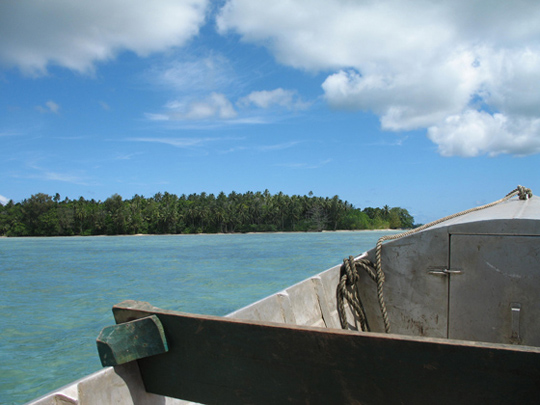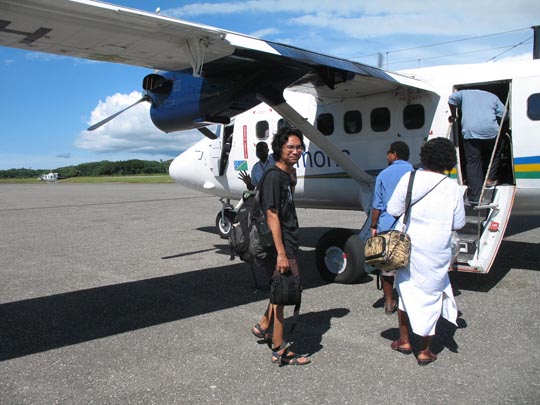
| |
| Home |
| Research |
| Publications |
| People |
| Teaching |
| Field Course |
| Conservation |
| Outreach |
| Adventures |
| Opportunities for students |
| Contact |
OPPORTUNITIES IN THE UY LAB |
FIELD WORK IN THE TROPICS |
The Project. -- We are looking for volunteer field assistants to assist in long-term field projects looking at signal evolution and speciation in birds. In general, our aim is to understand the diversity of signals in nature, and to this end we are monitoring several populations of birds that have diverged dramatically in plumage coloration, and, in some instances, song. Our goal is to uncover the underlying factors that drive these changes and to understand how these changes result in the formation of new species. For details click on the Research link to the left. Chestnut-bellied flycatchers: Island populations of the chestnut-bellied flycatchers (Monarcha castaneiventris) of the Solomon Archipelago have diverged in plumage color, extent of sex differences in color, and song structure. Populations range from conspicuous and dichromatic to inconspicuous and monochromatic. This project typically runs from January through May, and we sample several island chains throughout the Solomon Islands. For details, click on the Research link to the left. Field conditions are rustic and so we expect assistants to love the outdoors. Also, privacy may be minimal in the field, so we seek assistants who are courteous, mature and considerate of others. Finally, (and most importantly) fieldwork is long and tedious, often physically and mentally taxing. So we expect assistants to be patient, motivated and in great physical shape/health. Some of the methods we will use in the field include: 1) extended behavioral observations in blinds, 2) running field experiments, 3) bird banding with mist nets, 4) song recording and 5) measurement of the spectral properties of the plumage and the visual habitat using a portable spectroradiometer. Although having some field experience is an advantage, we are mostly looking for individuals who are enthusiastic, mature and willing to work hard. Assistants are expected to pay for their own travel to and from the host country. Once in the country, we will meet you at the airport and provide meals and lodging at the field site. Sorry, we do not provide a stipend or salary -- just a great learning experience!! |
 |
View of Lola Island from a boat. |
Warnings: Hazards in the Field. Working in the Tropics presents us with numerous dangers and inconveniences not regularly encountered in the U.S. and other more temperate regions. We expect assistants to be able to tolerate these conditions and use common sense to stay safe. Below is a not-so-complete list of what to expect in the Pacific. More detailed information can be found in Lonely Planet guides. Venomous Snakes. -- Unlike Australia and New Guinea there are very few terrestrial snakes that are venomous throughout the Solomon Islands. There is a venomous species in Guadalcanal, but it is shy and small. The most venomous snakes are sea snakes that one may encounter on the beach or while snorkeling. They are extremely venomous and students should stay away from them. Mosquitoes. -- Mosquitoes are very abundant at all the sites we monitor (with the exception of Santa Ana Island). As such, malaria is a major concern in the Solomon Islands. Using insect repellant and long sleeve shirts often helps. However, to be safe, we suggest Malaria drugs to insure that you don't contract this disease. Ants. -- Ants are abundant throughout the islands. They are mostly benign, but several species, especially the introduced fire ants, have potent stings. Just as in snakes, to avoid being stung be aware of your surroundings and never stick your hands in dark places. Microbes. -- Needless to say, the Tropics have an amazingly different microbial fauna than temperate regions. Hence, microbes in food and in the air can present many dangers. Take precautions when eating (e.g., do not eat raw, unwashed food or drink tap water) or whenever you get a cut. Minor cuts often turn into very bad infections if left unattended. Traveling. -- The most important advice we can give to students is to be aware. Like any city, Honiara can be dangerous, especially to tourists. So be careful, watch your possessions and do not get into situations that could compromise your safety (e.g., walking alone in a shady part of town). The Lonely Planet guides offer some excellent tips, such as which neighborhoods to avoid. But in general, the people of the Solomon Archipelago are extremely friendly and always willing to help. A bit of common sense goes a long way. |
 |
| Boarding a flight on one of Solomon Airlines' twin otter planes. |